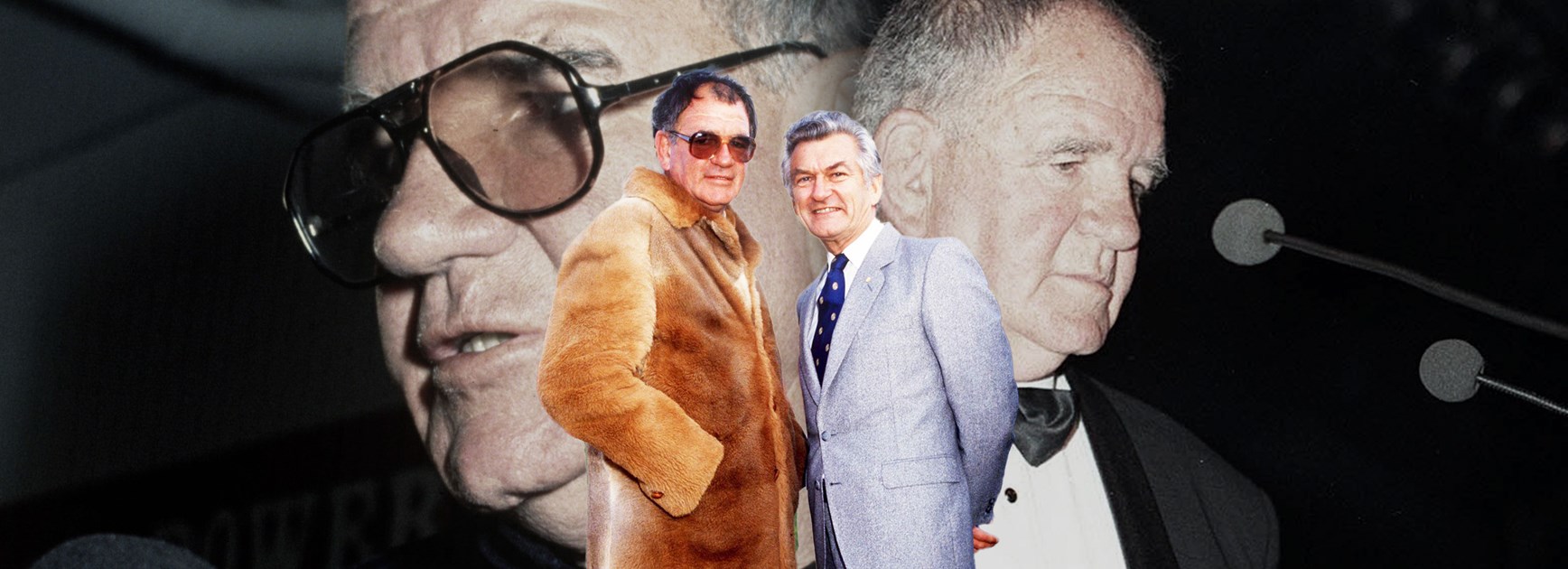
He was the original Supercoach.
Jack Gibson changed the way rugby league was coached.
In this interview with award-winning broadcaster Graham McNeice from 1995, Gibson talks about his career, his undefeated season at the helm of the Roosters, the breakthrough title win with Parramatta and the the best players he coached.
Graham McNeice: What was your background?
Jack Gibson: I was born in Kiama. Originally I was graded with St George and played in the junior competition in the St George area which was Cronulla. Cronulla wasn’t in the competition in those days.
Q: You came up and linked up Easts when?
A: Well I’d worked in the bush a lot and when I came back I had the opportunity to play with a team in the eastern suburbs called the Celebrity Club and I played two years with them. They were only in it two years a matter of fact.
Q: Coming from the bush was that daunting coming to the city?
A: I was only playing the juniors, so it wasn’t too daunting for me and I had played a few third-grade games for St George.
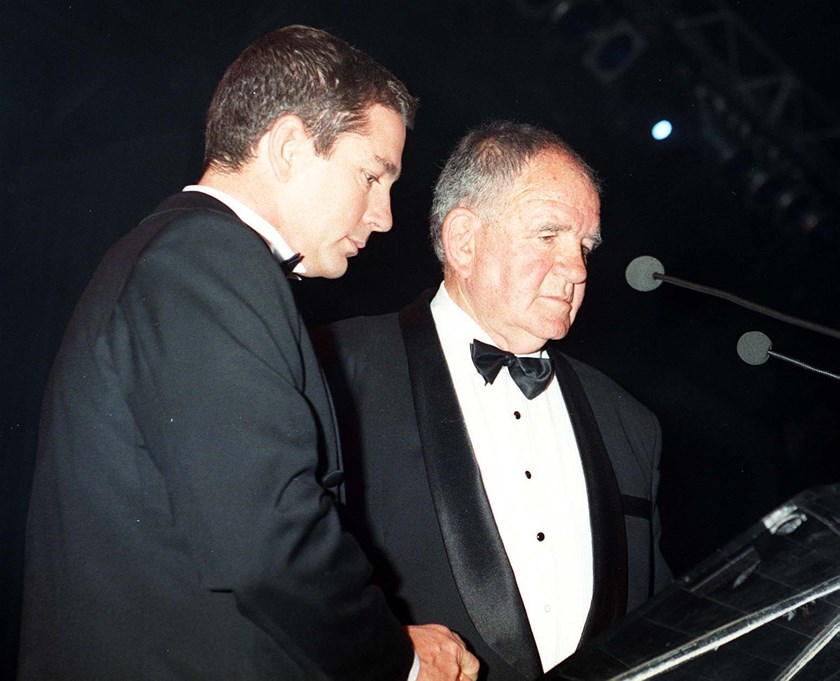
Q: When was it that you left Eastern Suburbs to play for Wests?
A: Well it’s getting close but I think I left there in ’62 and went to Newtown and I captained Newtown for a season and the following year I left and went to Western Suburbs for ’63 and ’64 and that was the end of my career after that.
Q: ’63 is probably one of the most talked about grand finals. Many believed they were robbed. Your interpretation of that day and [referee Darcy] Lawler’s handling of the match?
A: Well he shortened us up ... There’s not much more I could say probably on it without … It’s a long, long story which I keep at the moment.
Q: It was also a day famous for the Gladiators [photograph]. It was played in bad conditions.
A: Well they’re the worst conditions you could possibly get for a grand final because there was that cricket pitch in the middle which, with a certain amount of rain on it, and then it was impossible to play on.
Q: Case of slip, sliding away, wasn’t it?
A: Yeah but it’s still a game that somebody had to win and we’d beaten St George that year the first round of the competition, we’d beaten them the second round of the competition convincingly and we beat them in a final in a playoff but in those days they had the privilege of being the minor premiers to challenge us again. So that was the fourth time we’d played them that year.
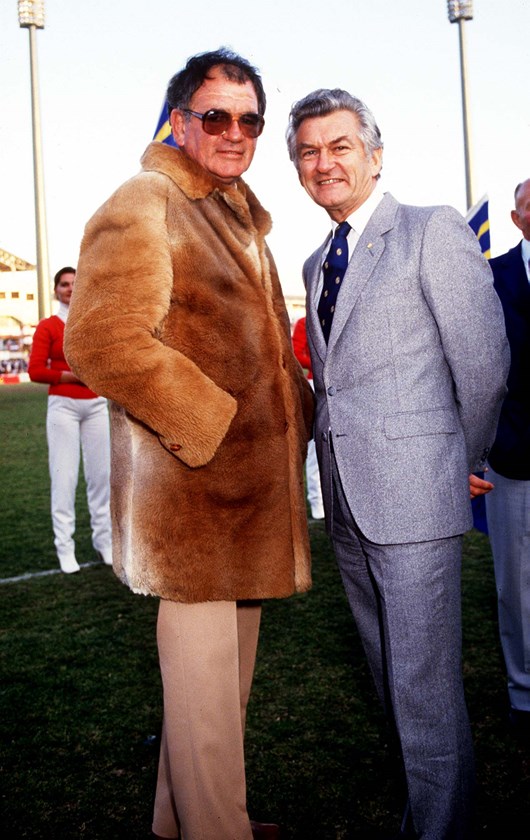
We may have played them in the pre-season or in a trial game. Possibly we played them five times that year but where it did count early, we won those games. We ran second in the grand final.
Q: In 1964 you decided to coach.
A: Well it wasn’t ’64, it was in ’65 went by and I followed Eastern Suburbs as a spectator. I’d go to several of their games and I put in for the job in ’66 but they had an Englishman there, a gent called Bert Holcroft.
Well they didn’t have much luck that year and they didn’t win a game. So the following year I put in for the job again and there wasn’t that many applicants. It made my task to get the job a lot easier.
But probably my campaign manager, only died the other day, a bloke called ‘Clicka’ Clarke, he did a little coaching over there and he worked for the club for many years and I probably owe Clicka. His personality helped me get that job cause he was on my side.
Q: You really turned the side around. What do you put the success down to?
A: Well I think I had a start because I really worked on defence for that particular year. And if we can, to keep the ball in play. What I mean by keeping the ball in play, was when you’ve got an opportunity to, when you get an advantage, to make sure we didn’t pass that advantage up quickly - such as to kick the ball out.
But I really worked on defence. I spent 50 per cent of my time in tackling practice with the players and [tyre] tubes and [tackling] bags and anything that I’d thought would benefit.
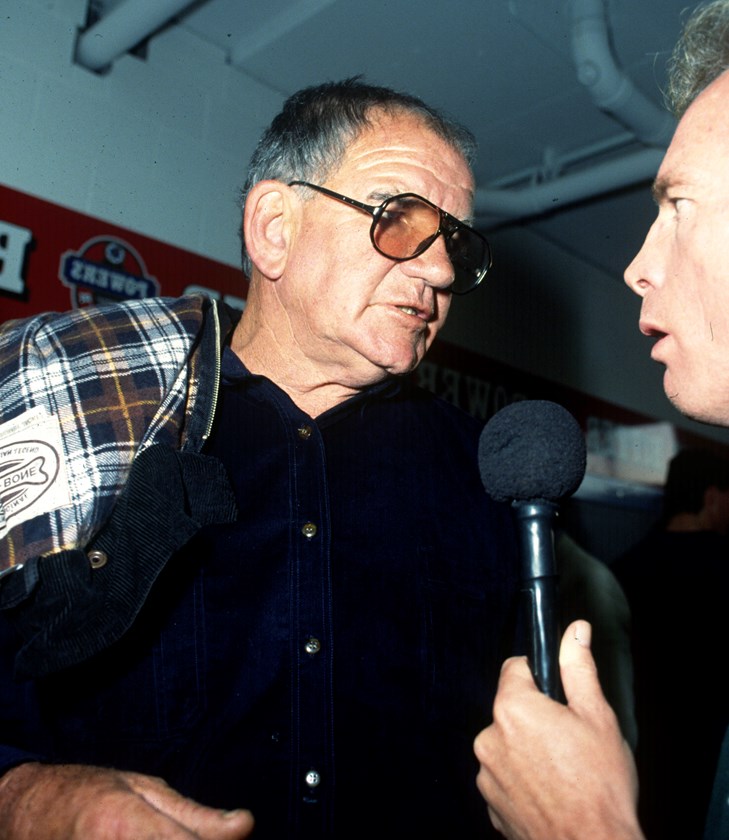
We lost our first three games then we had a draw and then we won our next nine and from there we finished up winning and getting into the playoffs. The reason we got into the playoffs I’d say defence won it for us because we only had 27 tries scored against us that year. That is going to remain a record.
Q: Incredible turnaround.
A: Yes it was.
Q: You acknowledged recently the captain [Jim] Matthews. Someone pretty special?
A: Well Jimmy Matthews used to play to his talent every Sunday and people liked to play with him. He’d get the job done. Few mistakes and he had a little quickness and he was an excellent goal kicker and he could get the football. He was an athlete.
Q: You turned things around for Easts, was it after that you went to St George?
A: No I stayed there the following year and we were in the playoffs again and the next year I didn’t do anything. The first year I coached there I received $1000, and that was OK.
I accepted that. But the next year we had a tougher climb and we had a better season and when I put my hand out for the cheque, I got $800. So. That didn’t inspire me to stay there probably.
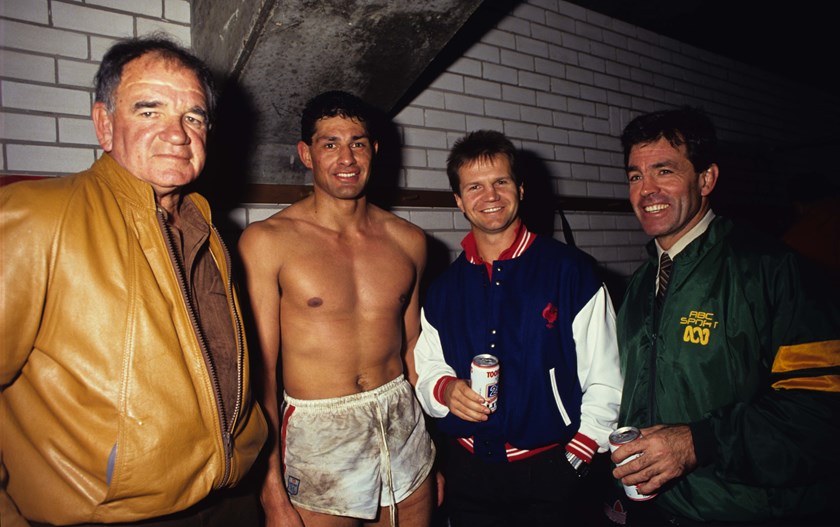
It didn’t inspire me to leave either for that matter, but I decided that the pay was a little light and I’ll just sit up in the stands. The following year I didn’t coach but the next year I really wanted a coaching job. I’d missed coaching.
And I got the St George job through the help of one person only and that was Norm Provan. If Norm wasn’t on my side I’d have no chance of getting the job. And I got to the final and grand final in the two years that I was there.
Q: The grand final of 1971 between St George and Souths was very close.
A: Look we played a championship team. Maybe if we would of won that game, Souths could of said they were unlucky. And I never begrudge them their win, South Sydney, because we were playing the best team in the competition.
But I think if I was a little smarter, I might have won that game. See we had the game, it was 20 minutes to go and there was two points difference and we were the team that looked like it was going to do something.
But a few minutes before the end came as far as we were concerned a couple of great players combined, Ronny Coote and [Bob] McCarthy, they combined and ran an excellent try up on our blind side and that didn’t put us out of our misery but ... that was it. We had no other time. Time had run out. They’d won the football game and they’re entitled to it.
Q: So how soon after that were you enticed back to Easts?
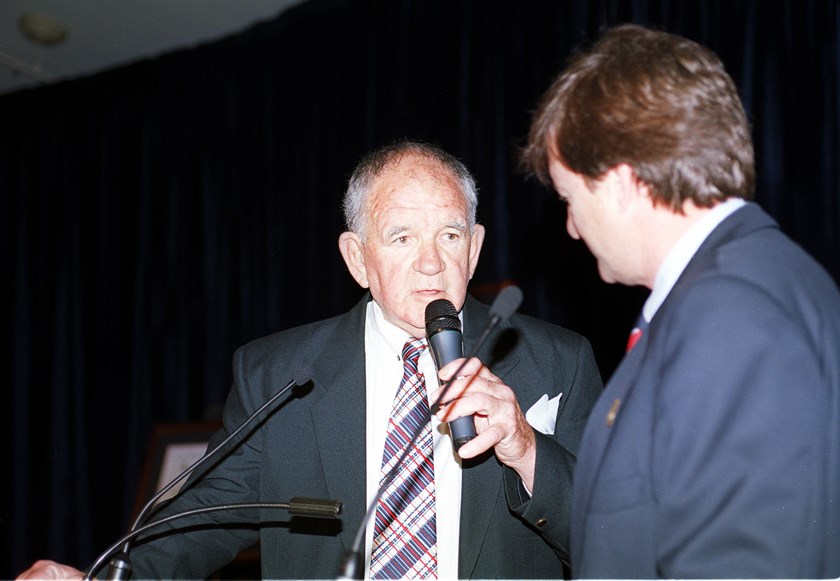
A: Well I never coached the following year. I had the opportunity to coach St George again but I didn’t coach that next year.
Q: Were you really disappointed after what happened that year?
A: I was extremely flattened by it … Normally you’re over a loss in a few days but that stayed with me a few weeks and I had no intention of coaching that year. But I got my second wind and a job came up with Newtown.
I was offered the job and I went there after a year off. I stayed there one year and we had a fine season. We won the Club Championship which they’d never won before. I had some fine players to do it too.
And we had the two teams in the playoff, the under 23s in the grand final and we made the final. But we were beaten by Cronulla and they went into the grand final and played Manly and Manly eventually won that. But we won the pre-season too so we had a fine season and I was quite prepared to stay there but I wanted to have more authority. I wanted to have the authority to employ my own people, my own coaches.
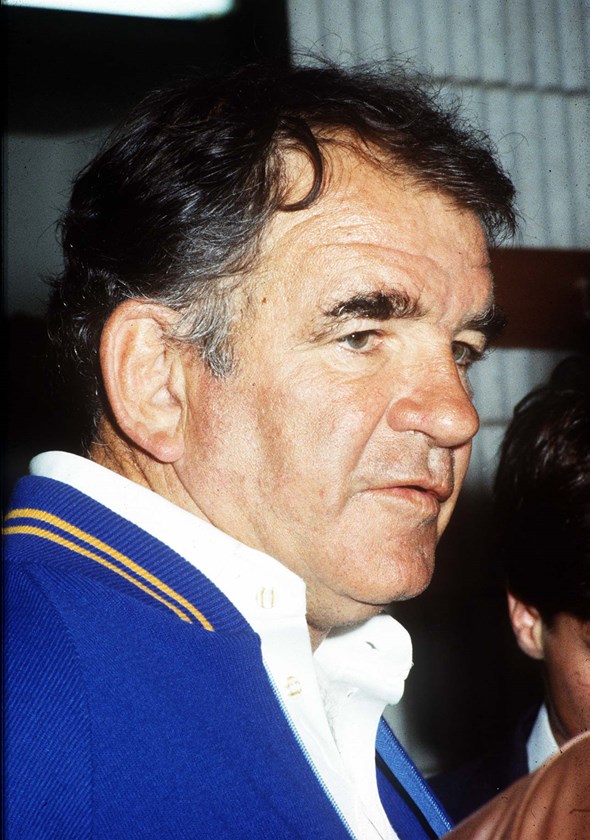
It was alright I brought a couple in, Mick Suter and Terry Fearnley, I think they came in with me. But I wanted more authority. I didn’t want to make a demand for it and I explained to them how that was important.
But they wanted to run under the same procedure as the previous year. So I decided I wasn’t going to do that and they accepted that alright. They didn’t seem too concerned, and then the Easts’ job came up again. So I didn’t have a year off, I went straight to Eastern Suburbs.
Q: Under the terms you outlined above?
A: I had the authority to hire and fire and I’d seen it. From coaches to rubbers (physiotherapists), to doorman to anybody that I could think could contribute. But I had that authority. Not that I ever used it.
I don’t remember sacking anybody but I had it and it was important to me that I had the, to have the authority and it was important for the people who worked with me knew that I had that authority.
Q: Magic period for Eastern Suburbs - 74/75 that they won the two grand finals. ’74 that was a marvellous season. That must have been very gratifying for you.
A: It certainly was. It was the first time we’d won a championship and the first time for Easts for roundabout 20 years. It was, well still when you look back you keep remembering the losing games. Not that there was that many. I think we won 19 straight in that first year, which included I think three or four in the Wednesday night Amco Cup competition at Leichhardt.
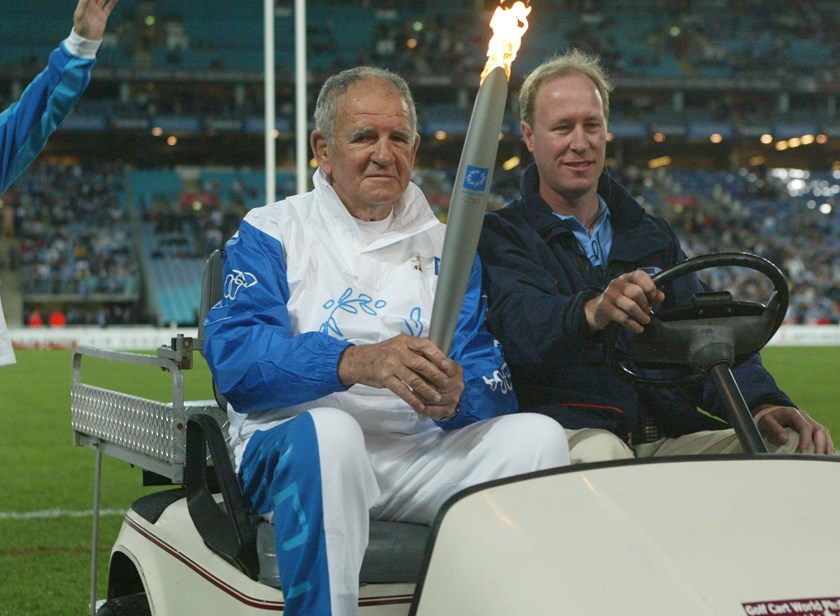
Q: Devastating side
A: We had a lot of talent. It was my job to see that I didn’t throw them out of gear. That was, I couldn’t add talent to them but my job was to protect that talent that they had and let them run with it.
Q: Were you responsible in bringing Russell Fairfax over from rugby union?
A: [Manager] Ron Jones made the first introduction with Russell Fairfax. The thing was I was asked was I interested in Fairfax and I’m pleased to say I said yes.
I wasn’t always interested in [rugby] union players because, not that they couldn’t play, and their game’s just as tough as ours, but I think a lot of them have been there that long that they’d find it very difficult to make a change. The game is different even though it looks the same. And I was very pleased with Russell. He was certainly an exciting player and had a tremendous year.
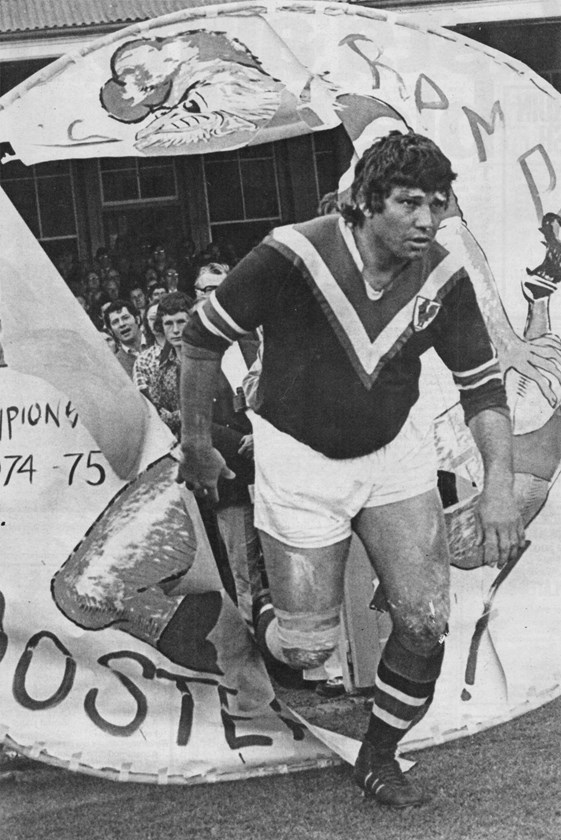
Q: When was your first introduction to Arthur Beetson?
A: First time I met Beetson was we were already training and the Kangaroos come back from overseas and Beetson had been back a week and we’d trained a couple of times that week. We were only doing one a Sunday and the following Sunday, Arthur turned up and he trotted around, he was fat and the next week he didn’t turn up.
I rang him up and said “Arthur if you hadn’t turned up for four weeks, I would’ve accepted that because you’ve had a tough season but now you’ve started to come, you be there every Sunday.” And he was. That was the first time I met him.
Q: He seemingly was something out of the box. Was he?
A: He was standout. He was an absolute standout. He was a game-breaker. He was something like Wally Lewis. I mean you watch the State of Origin games. The games would be tough and hard and all of a sudden Lewis would do something, score a try.
Well, Beetson could do that with Eastern Suburbs. He’d be making yards and then Beetson would split one up and put Fairfax away or [John] Brass away or [Bill] Mullins away.
He’d do something that would open up the whole joint and then that would start the trend for the rest of the time remaining in the match. He’d probably run two or three more [tries] in. He was extremely confident but one of his best assets, he could read defence. He could short cut defence and he was good at that you know. He could hit too.
Q: Quite an extraordinary player.
A: He had a lot of talent. He had the talent that people like. He had talent as a captain and people liked to play with him.
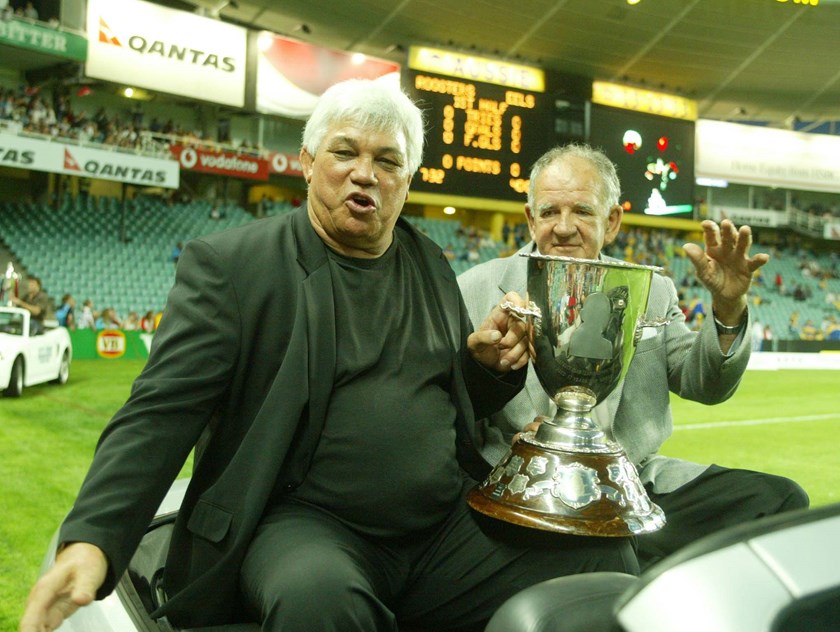
Q: You didn’t wrestle with that at all, making him captain?
A: Well I had. Cootey recently reminded me that he was captain when I went there and I took the captaincy off Cootey. It sounds like I robbed him or something. It probably felt like that, but I gave the captaincy before that to John Peard.
But the only thing I told John, was “You’re captain and you’ve got it till you lose it”.
There was no predictions how long he had it, or I was going to take it off him. He ran with it for a couple of weeks and then I picked Beetson and I gave Beetson the same edict. “Beetson you’re captain.” “How long coach?” “Till you lose it.”
Q: So how did he react to the responsibility?
A: He was excellent. He was accepted. He could handle the responsibility and some people can handle responsibility but it affects their games. Others can’t handle the responsibility and they get it [the captaincy] because they are a standout player. But Beetson didn’t fall away in either.
Beetson was an ideal captain, it didn’t put any pressure on him. It made him play better.
Jack Gibson
He improved in both. He was an ideal captain, it didn’t put any pressure on him. It made him play better. He thought more was expected of him, which he did, but he was concerned with his own game first which is the principle of a top captain. It’s my job to look after the team, but he was so well accepted and played so strong.
Q: ’75 was a complete 38-0 whitewash of St George in the grand final - were you surprised at the overall outcome of that?
A: Well if you beat St George … they were a strong side. They did get to the grand final. But I’ve been on the receiving end of football games like that. In the first half I think we led 5-nil and we had another try disallowed which I think the referee admitted after the game he’d made a poor decision, and we were doing it as tough as St George really.
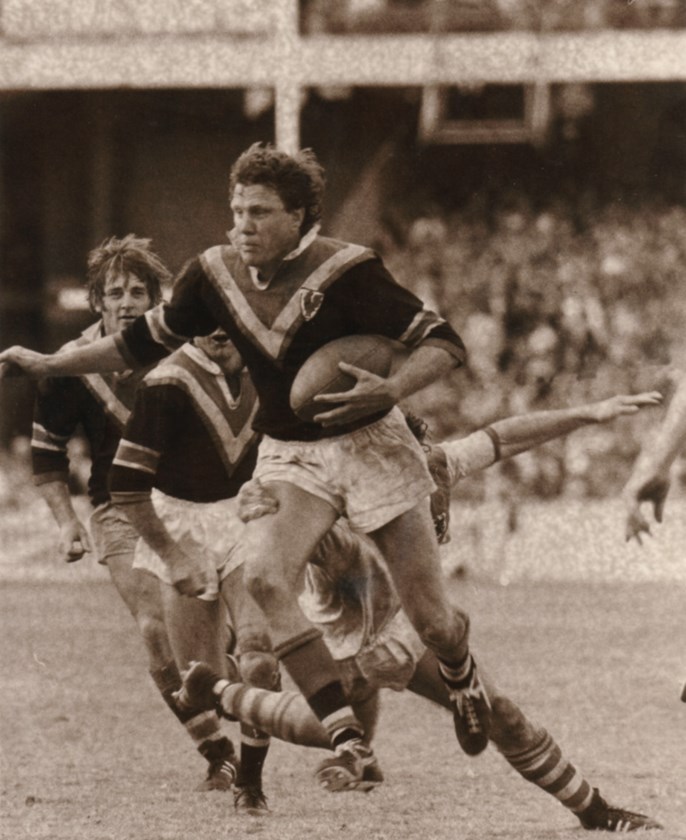
But then in the second half the flood gates opened which can happen to a football team and you got no way of stopping it. We just kept coming at them and putting the ball over the line.
But as I said I’ve been in other games where that thing’s happened to me and when I’ve walked away and watched the video, I think we hadn’t played that bad it was just a day, they got us.
Q: You went to the United States and studied gridiron. What sort of impact did that have on you as a coach?
A: Well when I went there I didn’t know what I was looking for. I could see how their coaches reacted to their game because the principle’s exactly the same as our game. We’re trying to catch the ball and put it up the other end.
Now if you’ve got the football, you’ve got to make some yards and if they’ve got the football you’ve got to stop them. So really the principles are exactly the same. We’re all looking for the same type of person.
We want somebody that can play a game, that can catch the ball, that can stop the runner, that when they’ve got the ball, can pick up some yards.
But when I went, I didn’t have a list of what I was looking for and I was lucky enough to make a friend who turned out was very close to me and we’re still close friends. It was Dick Nolan.
He was the head coach of the [San Francisco] 49ers and he was to remain there for nine years and I spent a tremendous amount of time with Dick. But they reinforced a lot of ideas I had.
One of the things I remember reading about on one of the stats sheets was that to be a top defensive player you need more talent than a ball runner. And I was pleased when I read that because I thought that was true and the explanation was that a person with the football, he reacts first and the defensive player’s got to stop that runner.
So he’s always got the advantage. So he’s got to make up that advantage in talent and quickness of thought and speed. And he's probably he’s got to be somebody who wants to hit somebody.
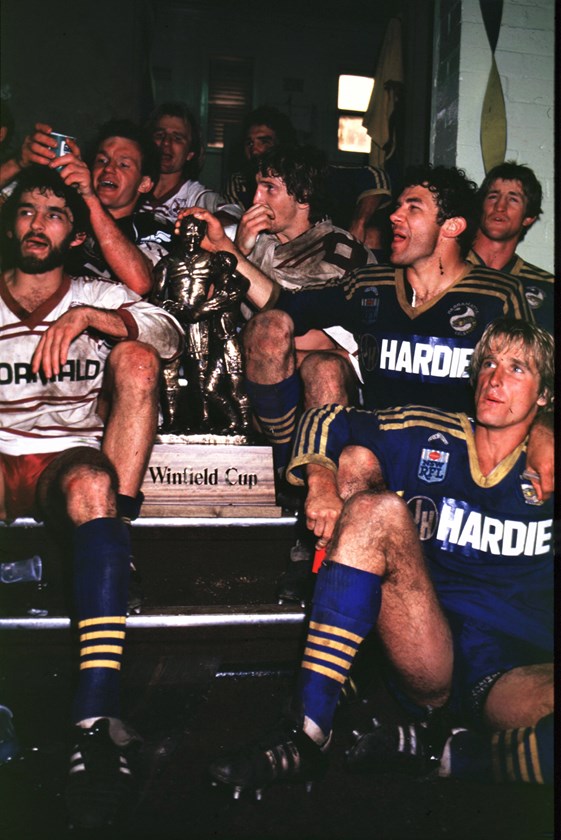
Q: That basically reinforced your feelings and thoughts on coaching?
A: Well they thought if your defence wasn’t intact, you couldn’t win, you know. Even with [a great] ball runner. He’ll sell your season tickets but the defensive player will get you to the grand final and win it for you.
So I stayed with defence for a long time and I spent a lot of time working at it. But now the coaches of our league they spend just as much time on defence. But I had an advantage then because they never practised defence and I did.
Q: The Parramatta side - a golden period for Parramatta and you were a part of their first premiership. Marvellous for you.
A: Well, for me, personally, it was more of a relief because of the expectations even though the year previous they never made the playoffs. So that was a little pressure off me, coming in the next year.
They were down a little bit and that’s natural, [which takes] a little pressure off the coach. So if you get ‘em into the playoffs the following year well you’ve improved them a little bit.
But we went all the way. I had six veterans in there and any one of them would have been an excellent captain and they could all play. To win a championship you’ve got to have a nucleus of six real tough, hard seasoned veterans in your football team. There’s nothing like it. You can’t win it on youth alone.
Q: Who were those players?
A: Well take [Bob] O’Reilly and [Ron] Hilditch, [Michael] Cronin and [Peter] Sterling - he was young in years but he was a veteran. [Ray] Price and [Kevin] “Stumpy” Stevens, who came over from Eastern Suburbs with us. The names should just drop off my tongue but I’ve just slowed up a little.
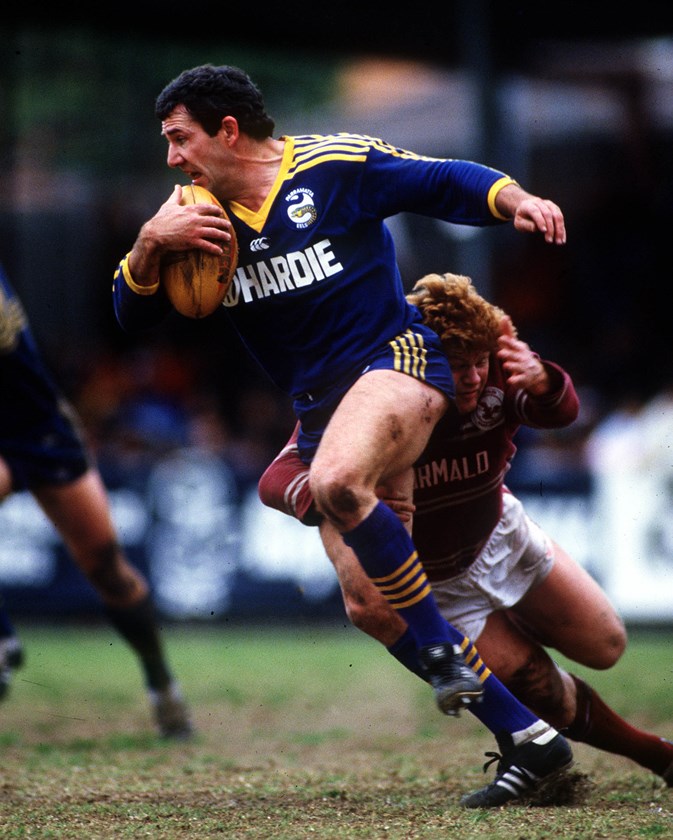
Q: I was at training at Parramatta in the early days. You used to have presentations for all the grades. Like a big family. There was also a dummy award.
A: Bonehead of the week. We had to restrict that a bit because some would win it too often. They had to put a shirt on “bonehead of the week” and wear it for that night if they gave some stupid penalty or got into some verbal with the opposition.
Q: It seemed like a family affair out there.
A: Well we did have respect. The players respected themselves and that’s the first requirement. But we still didn’t want them to be satisfied with our decisions either. The explanation to that is we didn’t want the second grade players thinking “Gee I’m happy to be in second grade”.

We certainly want the second-grade players [thinking], “Ooh I should be up in there in the one team” and [that it] was only bad selection by us that’s kept them down, you know, we wanted them to have an ego.
We didn’t want them to be satisfied … but again on Sunday you can only pick so many and it’s always tough. There’s always one tough decision to make on selection night.
Q: Sterling 1981 was a veteran at a young age - something out of the box?
A: He was the type of player that’d go into another football team that he’d never seen on video, and never heard of, and he could go in there and take the captaincy up and go and play halfback and you’d think he’d been playing there for five years with ‘em.
He’d assess the joint really quick. Yet he was small and slow, Sterlo. So that makes him a lot better. I could offer the parallel to [Johnny] Raper. Raper was small and slow, but what an outstanding player he was. And Sterling, he’d never win a foot race for you, but he’d win a football game for you.
Q: What about Cronin?
A: Well Cronin was a little quicker than people thought he was and probably his greatest asset [was] people wanted to play with him. And everyone played good around Cronin. See you could come off on Sunday and the crowd would say and think “Gee 'the Crow' never played that good”.
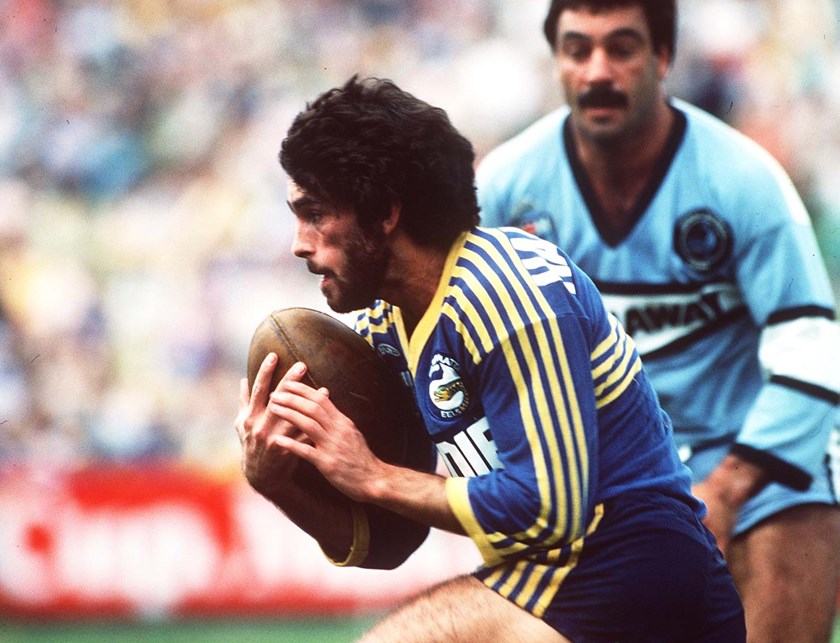
But you could look outside, maybe [Brett] Kenny’s on one side and [Steve] Ella on the other. Now they’re two smart players but they’d be beating it out for the game ball. You’d never, ever see people playing around Cronin that had a poor day. He had that talent. I don’t know what you’d call it, his talent. He made people play strong.
Q: Brett Kenny?
A: Well Kenny had a lot of things that made a player. He was tough. He could take tough coaching. He was quick, he could play defence, he was an excellent defensive player and he could sniff a try out. He’s an extremely talented ball handler. A ball a normal person would drop he’d catch.
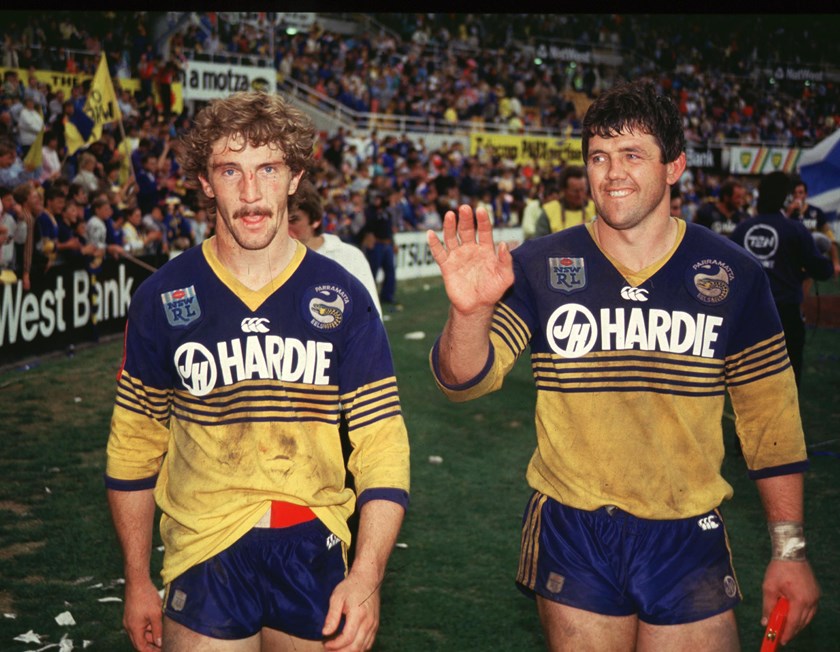
Q: Steven Edge?
A: Steven Edge. Well we made him captain and he carried the role and we had never had, in my memory, the thought that even with all the talent underneath to make somebody else the captain. He was excellent but when he didn’t play, he never played every Sunday, it was a tough job to pick somebody [else].
You had Price, he could do something. You had Sterling [who] was excellent and O’Reilly was excellent and Cronin was as good as you can get and so was Hilditch. I had five there you could pick them out of a hat and put one in.
Q: Three triumphant years with Parramatta. Amongst all the memories would they rate near the top for you?
A: Well the most impressionable, without doubt, was the first premiership because the whole town stopped. All those people had been cheering all those years, and walking home all they could say is “Well maybe next year”.
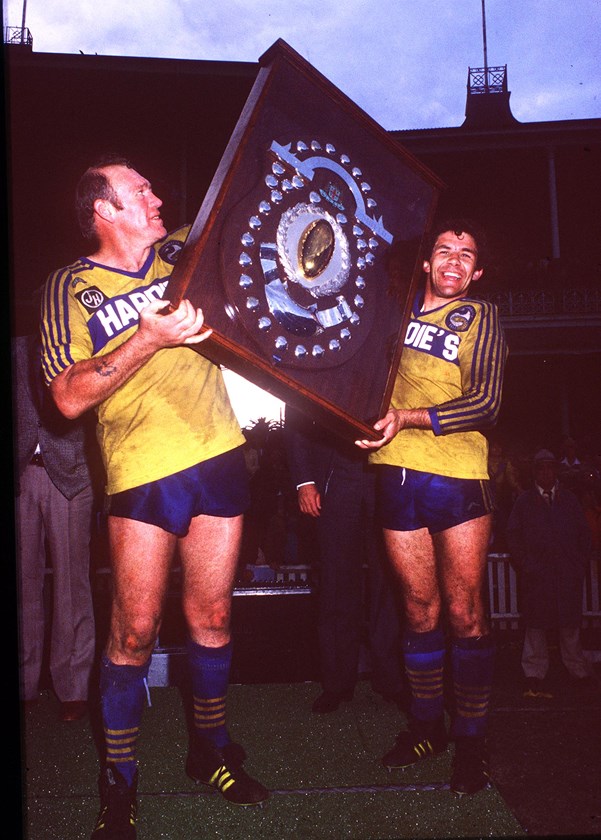
They didn’t have to say that anymore and that alone was a tremendous relief for the spectators. They’d been close in the past and they had the talent and they just missed out and all of a sudden they’d won a championship. It was something for the fans.
The local football team that they cheer for, is often in life is probably the only thing they’ve got going for them in a lot of respects. We don’t want to say that, but that’s a fact.
And when their football team goes down, they go down with them. [Team sponsor] James Hardie, the people from there, were telling me when Parramatta lost, their work attendance on Monday was down to hell, you know it was a very bad, there’d be a minimum of 10 per cent [of staff taking sickies].
When Parramatta won, they all turned up. They all went to work. They wanted to shake hands with each other and get that feeling. No-one stayed away Monday when Parramatta won on Sunday.
Q: In 1983 you shocked rugby league when you quit the club after three consecutive titles.
A: Yeah I was tired you know. I didn’t quit the club. I wanted to do something else. I didn’t retire from anything but I didn’t know. I had no intention of going anywhere else. I’d no fault with the place. We just decided to part company, “that’s it”, I thought.
I didn’t quit the club. I wanted to do something else.
Gibson on leaving Parra
Besides not that I’m a benevolent society but I did think that [assistant coach] John Monie, he’d been there with me for the three years and [it was an] opportunity for him to do something. It wasn’t as if I was walking out and abandoning the place. The staff we had were excellent and Monie won his own championship through his own talents.
Q: How important a role did Ron Massey play in Jack Gibson’s coaching?
A: Well Massey played a role that, look I’ve got to say this. If I could have got somebody better than Massey to work with, I’d have sacked myself.
The reason I’m saying that is because that’s what I’m getting paid for is to attract the best talent I can get. But I couldn’t of got anybody better than Ron to help me because he was never a ‘yes man’.
Under no circumstances would he agree with me just to please me. I’d say “we’re going to use [interviewer] Graham McNeice today” and he’d say “well I wouldn’t”, and I’d take notice of him and maybe I’d start to enquire into that. Maybe I’d go and watch the video again before I made the final decision.
But if he said “no we don’t use him on Sunday, I suggest you use somebody else”, well that had an impact on me. It’s like if I could use the parallel, it’s a bit hard to explain, he was like an enemy.
If you ever want to know your faults you go and talk to your enemies for a while because you know they’ll tell you. Massey was that way. He’d have his suggestions, I not always agreed with him either but the only reason I wanted him was because that wasn’t the proposition.
We disagreed many times, but it always made me think. He’d be concerned. He’d pick up things I’d missed out on. So he helped me through the good times and the bad times. Winning games and losing games. He contributed.
Q: Do you find in this electronic day that the referee is being asked to much?
A: Well it’s starting to think the man in the middle, his performance is deteriorating a little. It’s not that at all only, but the coverage is that much better and we can pick up mistakes a lot easier.
Q: Is it a regret that you never coached Australia?
A: I’ve never regretted it because when I was available to coach Australia, I always had a job. I could never have the talent required to be involved with two teams at the one time. It’s not, I’m not being a loyalist or true to the job. That’s not me.
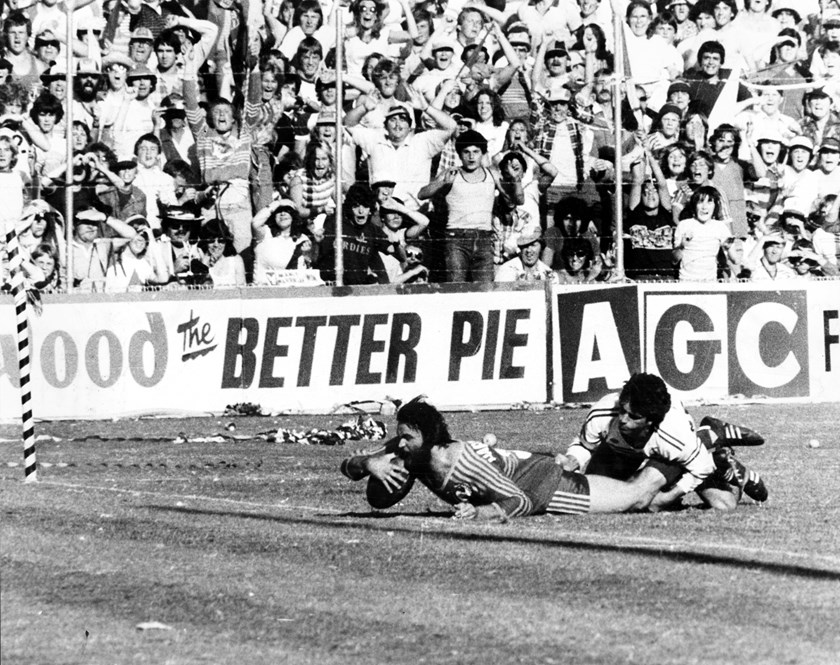
I couldn’t have handled it. I would’ve like to have that but if I was with an Australian team, I’d of been thinking about Parramatta all the time probably, and if I was at Parramatta I’d be thinking about the Australian job.
I couldn’t adapt. Some people can and they say “hey, go and do it”. I don’t see there’s anything wrong with it, far from it, but I couldn’t [have]. You know, just one team was enough for me because that’s never off your mind.
You abandon everything else in football. A coach abandons just everything else in a football season. He doesn’t play as much golf. He doesn’t go fishing. He’s just trying to work out a way how not to get beat and he’s got to do that 24 hours a day.
And he’s got to be able to adjust and [judge] all the advice he gets. Which advice is good and which advice he’s got to disregard. So it’s continually on the mind what’s going to happen on Sunday.
Q: The personal sacrifice is quite extreme isn’t it?
A: It is. It’s a personal thing, it’s extremely personal and it’s got to be more personal when you lose. When you win, “hey, the team done that”. The team won the football game, they just didn’t get beat. With me, I’ll put me hand up for that, and that’s how it’s got to be.
But you must, when things go wrong, the coach has got to stand up and say “that’s my responsibility”. And coaches now, they’re never judged on what type of job they do, they’re judged on how many games they win or lose and to me that’s a little sad in a lot of ways because every year they’re going to fire the coaches that run last, second last, third last.
They’re job’s at risk every year. ... But then it’s a land of opportunity. There’s no vacancy, they always put somebody else in there .
Q: Is there one team that you’ve coached that stands above all?
A: Well I think I mentioned a little earlier the best team that I think overcome more to win a championship was the first Parramatta team in ’81. I’m not saying they’re the best. I’m not saying they’re the worst. I find it very difficult to say which is the best but they overcame more I believe. They overcame more that season to win a championship.
The best team that I think overcome more to win a championship was the first Parramatta team in ’81
Jack Gibson
Q: Do you find yourself getting passionate about certain players and have sleepless nights?
A: I know that I’m smarter now in coaching than I was last year, but I know also that I haven’t got the stamina to take it on again. I haven’t got that, I don’t want to feel that way again.
I don’t want to walk home from a losing game. I’ve done that and it drags a lot out and that feeling, I don’t want that feeling to happen to me. It’s probably not that tough to get a coaching job, but I couldn’t handle it. Like I just couldn’t. The pressure’s too strong now.
When you lose, I mentioned this before, when the player gets beat, you know the sweat, he sweats it out, he goes in, he comes off, he’s physically busted and he’s mentally shot too after a 80 minute football game.
He comes off and showers and he walks away, and if he thinks that he’s played to his talents, he’ll accept that defeat. But the coach, he’s got to do it cold turkey.

He can’t go down and shower down. He doesn’t sweat unless he’s sitting in the sun. He’s just got to do it cold and he’s got to overcome that feeling before he can start and looking at the video and making some sensible decisions about what he’s going to do next week and come up with another reason how not to get beat.
Q: Good and bad memories
A: Well I didn’t mean to appear that way because I’m more concerned what’s going to happen next week. But I’m not an insurance man either. That I’m going to take out a lot of insurance to make sure next week’s going to be perfect. And I’ll roll with what happens. But when you look back, for my memory bank, it’s the losing games that stand out.


